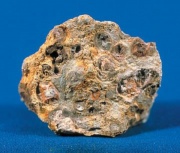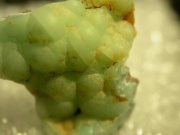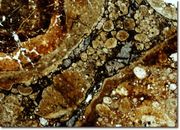Difference between revisions of "Bauxite"
| (One intermediate revision by the same user not shown) | |||
| Line 12: | Line 12: | ||
== Physical and Chemical Properties == | == Physical and Chemical Properties == | ||
| − | Decomposes in acids. Insoluble in water. No cleavage. | + | * Decomposes in acids. |
| − | + | * Insoluble in water. | |
| − | Fracture = earthy. Streak = white. Luster = dull. | + | * No cleavage. |
| − | + | * Fracture = earthy. | |
| − | + | * Streak = white. | |
| − | + | * Luster = dull. | |
| − | + | * Mohs Hardness = 1 - 3 | |
| − | + | * Density = 2.4-2.6 g/ml | |
| − | |||
| − | |||
| − | |||
| − | |||
== Resources and Citations == | == Resources and Citations == | ||
| − | * ''Encyclopedia Britannica'', | + | * ''Encyclopedia Britannica'', https://www.britannica.com/topic/Britannica-Online Comment: "bauxite" [Accessed December 4, 2001] |
* Jack Odgen, ''Jewellery of the Ancient World'', Rizzoli International Publications Inc., New York City, 1982 | * Jack Odgen, ''Jewellery of the Ancient World'', Rizzoli International Publications Inc., New York City, 1982 | ||
Latest revision as of 10:53, 2 May 2022
Description
A soft, aluminum-containing ore. Bauxite is an impure mineral that contains hydrous aluminum oxides and aluminum hydroxides. In 1821, the first commercial source of bauxite was a mine near Les Baux, France; since then deposits have been found worldwide. Bauxite ores are usually a mottled reddish brown but can also be white, gray, yellow, or red. They typically contain 30-75% Aluminum oxide. In antiquity, bauxite was used as an ornamental stone. Currently it is used as a source for metallic Aluminum and as a filler in cement, rubber, plastic, and paints. Major deposits of bauxite are found in France, Italy, Greece, Suriname, Guyana, Ghana, Guinea, India, Brazil, Jamaica, Australia, and the U.S.(Arkansas).
Synonyms and Related Terms
gibbsite [Al(OH)3]; boehmite [AlO(OH)]; diaspore [HAlO2]; Bauxit (Deut.); bauxita (Esp.); bauxite (Fr., Port.); bauxiet (Ned.); bauksitt (Nor.); boksyt (Pol.); bauxit (Sven.)
Physical and Chemical Properties
- Decomposes in acids.
- Insoluble in water.
- No cleavage.
- Fracture = earthy.
- Streak = white.
- Luster = dull.
- Mohs Hardness = 1 - 3
- Density = 2.4-2.6 g/ml
Resources and Citations
- Encyclopedia Britannica, https://www.britannica.com/topic/Britannica-Online Comment: "bauxite" [Accessed December 4, 2001]
- Jack Odgen, Jewellery of the Ancient World, Rizzoli International Publications Inc., New York City, 1982
- Robert Fournier, Illustrated Dictionary of Practical Pottery, Chilton Book Company, Radnor, PA, 1992
- Thomas C. Jester (ed.), Twentieth-Century Building Materials, McGraw-Hill Companies, Washington DC, 1995
- C.W.Chesterman, K.E.Lowe, Audubon Society Field Guide to North American Rocks and Minerals, Alfred A. Knopf, New York, 1979
- Wikipedia: http://en.wikipedia.org/wiki/Bauxite (accessed Sept 2. 2005)
- R. J. Gettens, G.L. Stout, Painting Materials, A Short Encyclopaedia, Dover Publications, New York, 1966
- G.S.Brady, Materials Handbook, McGraw-Hill Book Co., New York, 1971 Comment: p. 87
- The American Heritage Dictionary or Encarta, via Microsoft Bookshelf 98, Microsoft Corp., 1998


